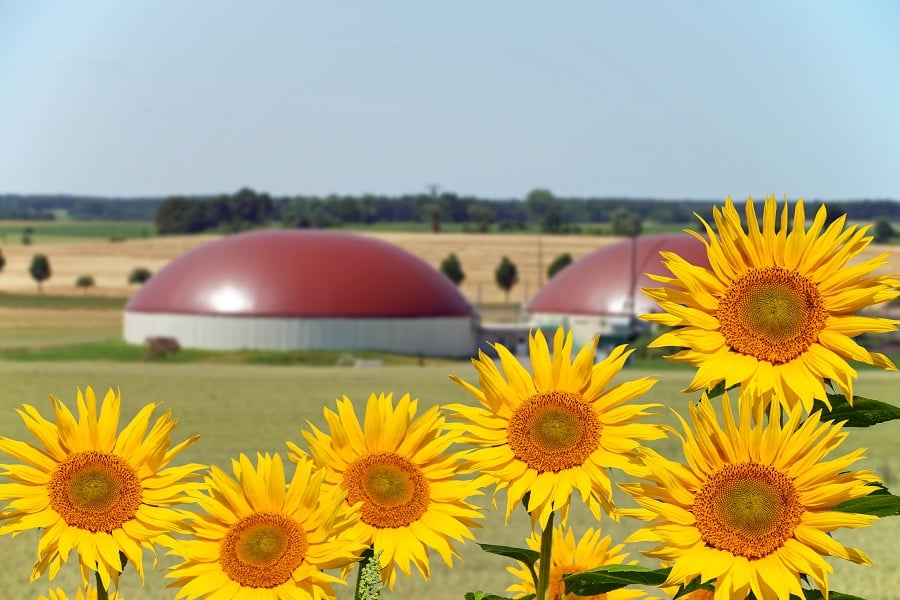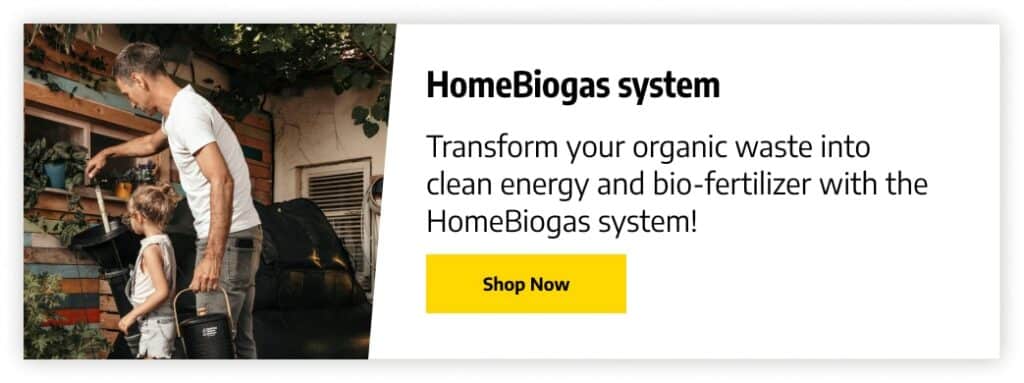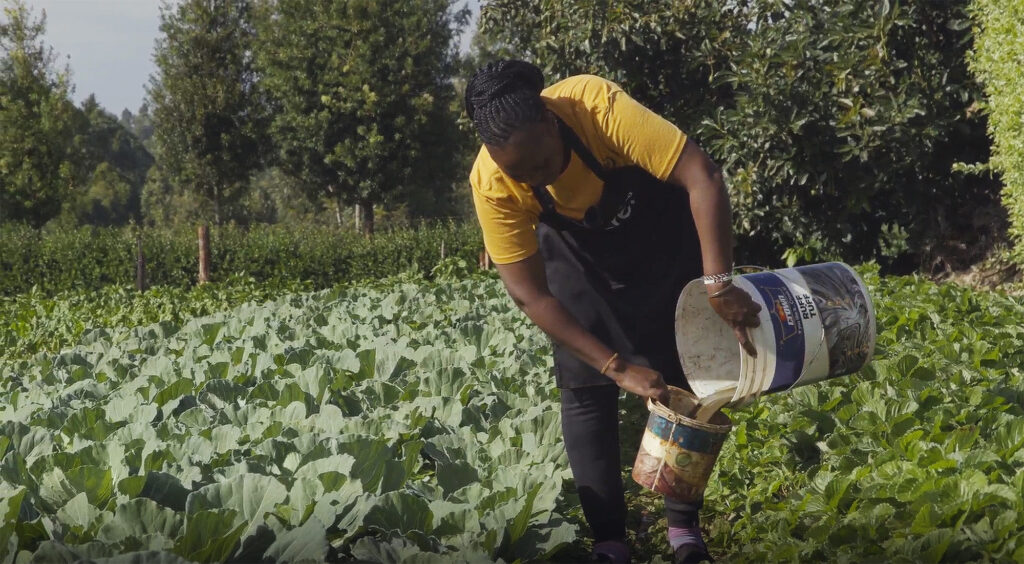
What is Biomethane Fuel?
Biomethane fuel, also called “green gas,” is a biofuel that mirrors natural gas composition and can substitute it.
It’s produced through the transformative power of anaerobic digestion — bacteria break down organic materials in an oxygen-free environment and produce biogas. What sets this renewable gas apart is its potential for purification. By stripping away carbon dioxide and impurities, you yield biomethane.
Biomethane production has a dual impact on environmental sustainability:
- It puts waste materials to good use instead of letting them decompose in landfills and release methane into the atmosphere. Converting methane into biomethane reduces greenhouse gas (GHG) emissions, contributing to climate change mitigation.
- It aligns with the circular economy ethos, turning discarded organic wastes into valuable energy sources. Its versatility further adds to its appeal – biomethane can seamlessly integrate into the existing gas network, powering homes, generating electricity, and fueling vehicles.
Biogas and Biomethane — What’s The Difference?
Both biomethane and biogas contain methane and carbon dioxide but in different ratios. Biogas comprises approximately 60% methane (CH4) and 40% carbon dioxide (CO2), with traces of other substances — great for combined heat and power generation.
On the other hand, biomethane is a refined iteration of biogas. The purification process eliminates most of the carbon dioxide and all the hydrogen sulfide and water content, making biomethane akin to natural gas in its properties.

Production of Biomethane Fuel
The production of biomethane fuel is a sustainable and environmentally beneficial process that uses organic waste materials to generate a renewable energy source.
Here’s a broad look at the process:
- Biomethane production starts with feedstock collection. You can obtain biomethane fuel from agricultural residues, livestock waste, food waste, woody biomass, municipal solid waste, sewage sludge, and other organic materials. After collection, the feedstock is often processed to ensure uniformity and optimal conditions for digestion.
- The collected feedstock gets into an anaerobic digester. It’s a controlled, oxygen-free environment where microorganisms break down the organic material and produce biogas.
- The biogas is collected from the digester. It has significant amounts of carbon dioxide, water vapor, and other trace contaminants at this stage.
- The biogas undergoes an upgrading process. It’s a two-step operation that includes cleaning (removal of water vapor and trace contaminants) and upgrading (removal of CO2 content). It generates biomethane consisting of 95–99% methane and only 1–5% carbon dioxide, with no trace of hydrogen sulfide (H2S).
The purified biomethane meets the specifications and composition standards required for integration with conventional natural gas supplies. Therefore, biomethane can flow through existing natural gas pipelines and distribution infrastructure.
Applications of Biomethane Fuel
Biomethane fuel has diverse applications spanning various sectors, including energy generation and transportation. Compressed or liquefied biomethane becomes a potent fuel source for buses, trucks, and passenger cars. The adoption of biomethane as a vehicle fuel not only aids in emission reduction but also contributes to enhancing air quality within urban environments.
Beyond transportation, biomethane’s impact extends to heat and power generation to meet immediate energy needs while staying aligned with long-term sustainability objectives. Injected into natural gas grids, it fuels homes, industries, and power plants, providing a reliable and eco-friendly energy source.
Biomethane’s applications are not limited to energy and alternative fuels; they also encompass effective waste management. This circular economy approach minimizes waste disposal challenges and promotes responsible resource usage for a long-term environmental impact.
6 Ways to Get Biomethane Fuel
Industrial Biogas Plants
Dedicated biogas plants use large-scale anaerobic digesters to break down organic waste and produce biogas. The raw biogas is then upgraded and refined to create biomethane and reduce fossil fuel needs.
Agricultural Biogas Systems
Farms and agricultural operations can use biogas systems to recycle animal manure, crop residues, and agricultural byproducts. Once the biogas is collected, it can be further processed into biomethane.
Wastewater Treatment Plants
The biomethane fuel from human waste serves for electricity generation, contributing to the plant’s energy self-sufficiency.
Food Waste Recycling
Food scraps from households, restaurants, and commercial establishments can also become biomethane fuel. All the leftovers can be collected and processed in dedicated facilities to produce biogas and, through upgrading, biomethane.
Co-digestion
This process to obtain biomethane fuel involves combining multiple types of organic materials in an anaerobic digester to enhance biogas production.
Landfill gas recovery
The process involves the extraction of methane gas from solid waste in landfills. It takes about five to ten years for decomposition to yield a commercially significant volume of methane gas that can further become biomethane.
Environmental Benefits of Biomethane Fuel
- Biogas and biomethane can potentially reduce greenhouse gas emissions. When waste decomposes in landfills, it releases methane — a potent greenhouse gas that contributes to global warming. By capturing and using this methane to produce biomethane, the release of these emissions is prevented.
- Biomethane fuel is considered carbon neutral or even carbon negative — the carbon dioxide released when we use the biofuel is roughly equivalent to the carbon dioxide that was absorbed by the plants during their growth, preventing additional emissions into the atmosphere.
- Waste gets a productive use as a valuable renewable source of energy.
- When used in vehicles, biomethane fuel produces lower levels of harmful pollutants, improving air quality.
- Human activities continuously generate the feedstock necessary for creating biogas and biomethane, making it a sustainable energy option for long-term energy security.
- Biomethane production is a component of the circular economy model, where waste materials are recycled and repurposed to maximize resource utilization.

Challenges of Biomethane Fuel
Technical challenges:
- The existing infrastructure limits access to biomethane fuel stations, hindering demand growth for biomethane as a transportation fuel.
- The availability and consistency of suitable organic waste feedstock can impact the scalability of biomethane production.
- Biomethane fuel can have a lower energy density than conventional fossil fuels, requiring more extensive storage and potentially reducing natural gas vehicle range.
Economic challenges:
- Biogas and biomethane production facilities require high upfront investments.
- The costs of managing biogas plants and upgrading technology to turn biogas into biomethane can further impact the commitment to shift to renewable gas production.
Ethical and environmental challenges:
- Growing energy crops to obtain solid biomass can compete with food production.
- The purification and biogas upgrading process can be technically complex and energy-intensive.
Future Outlook and Emerging Trends
The growth of the biogas and biomethane industry depends on diverse national and regional policy frameworks shaped by regional renewable energy aspirations. For example, biomethane fuel is central to the EU’s strategy to reduce GHG emissions, so many European countries have implemented policies to promote biomethane as a significant alternative to natural gas.
At the same time, to prevent the misuse of food crops, the EU introduced the concept of advanced biomethane, a term used to push for sustainable biogas production at scale using only waste materials. With supportive legislation, we can expect further investment in research and development to improve existing technology and scale biomethane and biogas production.
Furthermore, the Sustainable Development Scenario (SDS) by the International Energy Agency (IEA) projects accelerated biogas production worldwide. It will happen mainly through household digesters, with an estimated expansion to 5 million biodigesters in rural areas and developing economies by 2040.
Simultaneously, larger centralized biodigesters could capture agricultural waste and generate biogas at a scale of 500 to 1,000 m3/hour. With such numbers, biogas production is expected to contribute to gas grid supplies worldwide significantly.
North America, too, aims for a substantial market expansion, driven by increased demand from the automotive sector seeking emission reduction. The growing number of biomethane facilities across the US has the potential to reshape global power needs and stimulate industry growth, presenting viable alternatives to coal and natural gas.
Meet HomeBiogas — Turn Your Waste into Biomethane and Bio-Fertilizer
With HomeBiogas, you can benefit from the power of anaerobic digestion in your backyard. HomeBiogas offers the opportunity to create biogas easily and for an affordable investment. You set up the biodigester in your yard, feed it farm waste and food scraps, and will soon collect biogas.
With HomeBiogas you create Biomathane easily and you reduce your dependence on conventional fuels, contributing to a more sustainable future. It’s an environmentally conscious solution that helps household, farms, or any establishment cut waste management and energy costs.
As you generate renewable natural gas, you also produce high-quality bio-fertilizer as a byproduct. This nutrient-rich fertilizer enriches the soil quality, promoting healthier plant growth and enhancing crop yield. It’s a system that can support your commitment to a circular economy, where you transform waste into valuable resources, contributing to a more sustainable and productive agricultural landscape.
Summary
Biomethane can substitute conventional natural gas and mitigate its environmental impact. Its adaptable applications make it a versatile solution for sustainability and energy efficiency, from powering transportation and heating homes to enriching soil through bio-fertilizers.
Waste becomes a resource, and biogas and biomethane adoption at scale so future generations can thrive in a cleaner, more balanced world.







